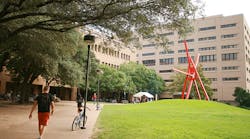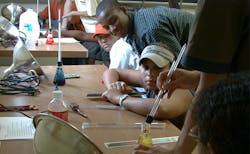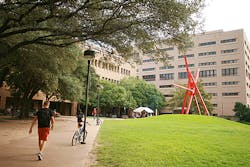Texas Engineers Build High-Performance Transistors Using Inkjet-Printing
In the last decade, methods for producing electrical components and devices by inkjet printing them onto paper, plastics and other materials have advanced, opening the door for enhanced functionality and a new generation of electronics made from sustainable materials.
But so far it is still not possible to inkjet print— using the same inkjet-printing process that drops ink on paper — high-performing electronics, such as computers or mobile phones. Read More
Engineers Invent a Bubble-Pen to Write with Nanoparticles
Researchers in the Cockrell School of Engineering at The University of Texas at Austin have solved a problem in micro- and nanofabrication — how to quickly, gently and precisely handle tiny particles — that will allow researchers to more easily build tiny machines, biomedical sensors, optical computers, solar panels and other devices.
They have developed a device and technique, called bubble-pen lithography, that can efficiently handle nanoparticles — the tiny pieces of gold, silicon and other materials used in nanomanufacturing. The new method relies on microbubbles to inscribe, or write, nanoparticles onto a surface. Read More
New ‘Self-Healing’ Gel Makes Electronics More FlexibleResearchers in the Cockrell School of Engineering at The University of Texas at Austin have developed a first-of-its-kind self-healing gel that repairs and connects electronic circuits, creating opportunities to advance the development of flexible electronics, biosensors and batteries as energy storage devices.
Although technology is moving toward lighter, flexible, foldable and rollable electronics, the existing circuits that power them are not built to flex freely and repeatedly self-repair cracks or breaks that can happen from normal wear and tear. Read More
Cockrell School and NASA Expand High School STEM Initiative, Launch New Online ProgramNASA has selected the Cockrell School of Engineering at The University of Texas at Austin for a five-year, $1.3 million grant that will support the national expansion of a STEM program that gives high school students and teachers the opportunity to use NASA resources and work directly with engineers at UT Austin’s Center for Space Research (CSR).
The grant will support students from across the country to perform research; increase their skills in science, technology, engineering and math; and learn valuable lessons about earth systems from NASA’s fleet of satellites. Read More
New Cathode Material Creates Possibilities for Sodium-Ion BatteriesLed by the inventor of the lithium-ion battery, a team of researchers in the Cockrell School of Engineering at The University of Texas at Austin has identified a new safe and sustainable cathode material for low-cost sodium-ion batteries.
During the past five years, sodium-ion batteries have emerged as a promising new type of rechargeable battery and an alternative to lithium-ion batteries because sodium, better known as the main element of salt, is abundant and inexpensive. In contrast, lithium-ion batteries are limited by high production costs and availability of lithium. Read More
Overview
The Cockrell School of Engineering at The University of Texas at Austin is a top ranked epicenter of engineering education, and knowledge creation and distribution. Comprised of renowned educators, researchers and thought leaders, the Cockrell School addresses the grand challenges of the world, drives economic progress and improves quality of life.
With nine internationally recognized undergraduate programs and thirteen acclaimed graduate degree programs, the Cockrell School propels research and innovation, develops transformative technologies and cultivates solutions to advance society.
The Cockrell School educates future engineering leaders who think creatively, work collaboratively, and push technological boundaries; develops innovative solutions through groundbreaking research; and improves lives throughout the world by leveraging the school’s entrepreneurial ecosystem and partnerships with industry to translate research into practice.



